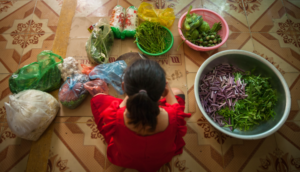Glasgow Caledonian University set up the Grameen Caledonian College of Nursing to support the poorest women in Bangladesh to become nurses, reducing mortality rates.
Social impacts
- Boosted Bangladesh’s capacity to improve maternal health and reduce the child mortality rate by graduating 138 nurse-midwives, and recruiting 150 students in 2014 alone.
- Improved the financial position and health of up to 200 disadvantaged women per year.
- Provided these women with life skills to enable them to make their own decisions in life, traditionally reserved for “guardians”.
Business impacts
- Entered a new market in Bangladesh, and generated income in 2014 of £222,000, with future revenue streams secure through annual student numbers of over 200.
- Major reputational capital generated by pioneering successful implementation of a social business model that is economically and socially sustainable.
- Increased opportunities for volunteering in an international context, providing staff with enhanced personal and career development opportunities.
“GCU is very proud of this College for disadvantaged young women of Bangladesh, based on an innovative, sustainable social business model. It is having a real impact on poverty, health, and the empowerment of women in rural communities. It demonstrates what can be achieved when the determination and foresight of a Nobel Laureate is supported by the professional excellence of local and international college staff.”
– Professor Pamela Gilles,
Principal, Glasgow Caledonian University
Grameen Caledonian College of Nursing (GCCN) was set up in 2010 by GCU (Glasgow Caledonian University) in partnership with Grameen Health Care Trust to address the desperate shortage of nurses and midwives in Bangladesh.
There are only 25,000 nurses for a population of 160 million. 87% of women deliver without any skilled birth attendant, and maternal mortality is 194 per 100,000 (2010).
The GCCN trains disadvantaged young women with poor life chances from the most deprived rural areas in Bangladesh to be nurse-midwives. The initiative helps towards reducing mortality by teaching maternity standards at an international level, as well as empowering young women with the skillset to be future leaders in the nursing and health case sectors in Bangladesh.
GCCN is the first nursing-midwifery college in the world using a social business model – bringing together a university, a bank, donors and social enterprises. This sustainable business model is replicable and could be used in other locations.
“GCU is very proud of this College for disadvantaged young women of Bangladesh, based on an innovative, sustainable social business model. It is having a real impact on poverty, health, and the empowerment of women in rural communities. It demonstrates what can be achieved when the determination and foresight of a Nobel Laureate is supported by the professional excellence of local and international college staff.”
The Unilever International Award supported by Business Fights Poverty recognises businesses that have positively impacted one or more of the United Nations Millennium Development Goals (MDGs). The Award is part of Business in the Community’s Responsible Business Awards.
The companies awarded a Big Tick in this category have positively impacted over seven million beneficiaries. These companies are helping to eradicate extreme poverty, promote gender equality, support various aspects of the health agenda, and build global partnerships for development between civil society, business and governments. These programmes demonstrate innovation, scale and the potential to be replicated, highlighting the importance of business as a key enabler of the MDGs.
The case studies profiled in this week’s special on Business Fights Poverty provide more detail about the programmes that achieved a Big Tick and those shortlisted for the top accolade. For more information, click here.
This blog was previously published on Business In The Community and is reproduced with permission.










